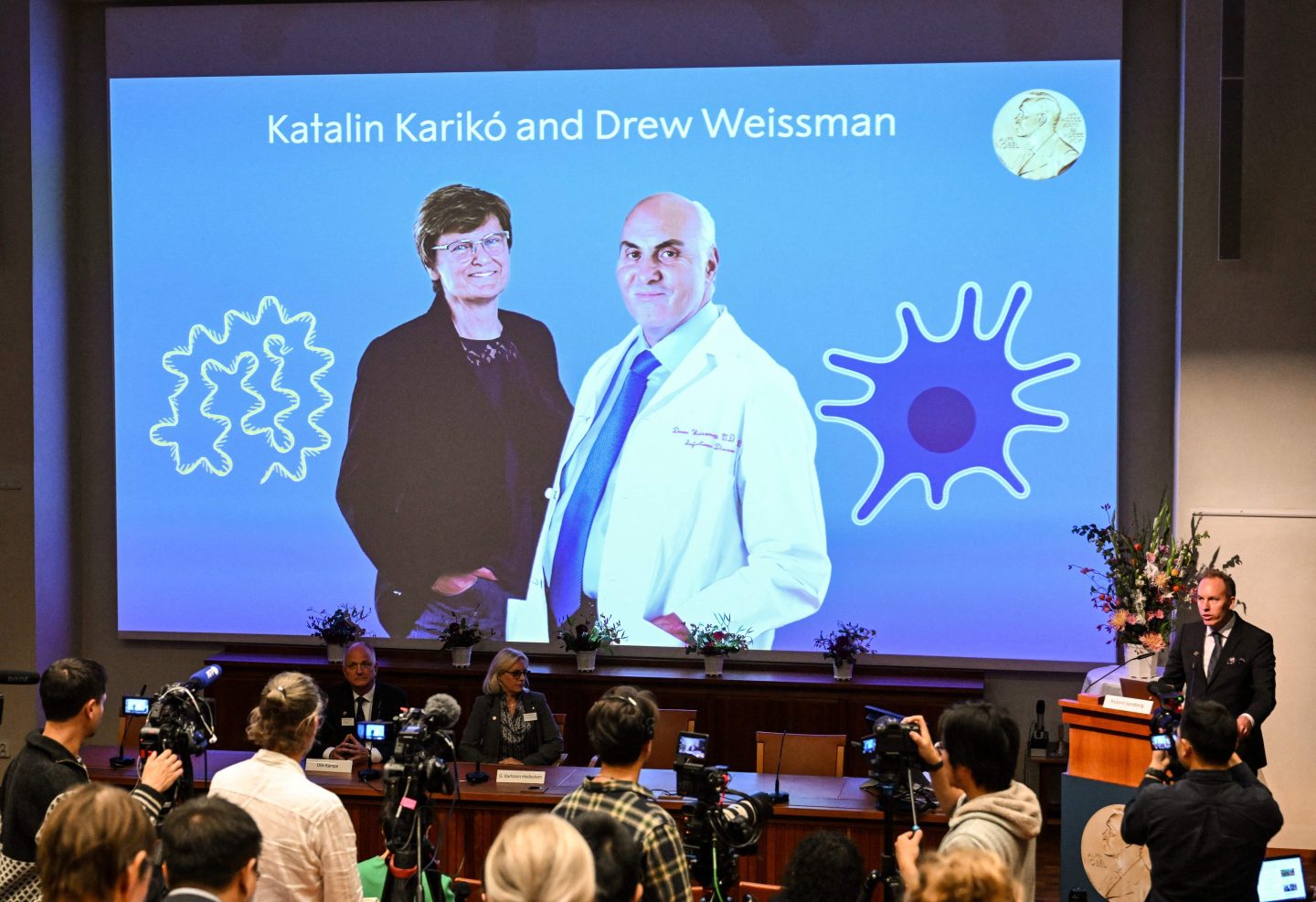Katalin Kariko and Drew Weissman won the Nobel Prize in medicine for research that laid the groundwork for some of the best-selling medicines of all time: the messenger-RNA vaccines against Covid-19.
The scientists’ work helped pioneer the technology that enabled Moderna Inc. and the Pfizer Inc.-BioNTech SE partnership to swiftly develop pandemic shots. The vaccines have been given to hundreds of millions of people around the world, a key step toward easing the coronavirus pandemic.
The two scientists will share the 11 million-krona ($1 million) award, the Nobel Assembly at the Karolinska Institutet in Stockholm said in a statement Monday.
Kariko and Weissman showed how to solve one of the major problems of mRNA by tweaking it to avoid causing inflammation. Their research, published in 2005, was one of the building blocks that allowed it to be introduced into the body.
“Through their groundbreaking findings, which have fundamentally changed our understanding of how mRNA interacts with our immune system, the laureates contributed to the unprecedented rate of vaccine development during one of the greatest threats to human health in modern times,” the Nobel Assembly said.
The two scientists’ work became the basis for a new type of inoculation. Instead of introducing weakened or dead virus into the body to prompt the immune system to recognize an infection, mRNA is used to prompt cells to produce what’s needed for a vaccine themselves. The approach is much quicker than conventional ones, and enabled Moderna and the Pfizer-BioNTech team to develop shots against Covid in less than 11 months.
Kariko, born in Hungary, and Weissman, an American, labored in relative obscurity for years with an approach that many other scientists had written off as too difficult to use.
Xerox Machine
The daughter of a butcher, Kariko was born in 1955 and grew up in a small town in eastern Hungary. She earned her doctorate in biochemistry at the University of Szeged, working with RNA for the first time in 1978. In 1985, she moved to the US for a job at Temple University in Philadephia, then later became a research assistant professor at the University of Pennsylvania. For years, she struggled to get academic recognition for her work. After failing to get grant funding, she was demoted in 1995.
Kariko, reached by Thomas Perlmann, secretary of the Nobel Assembly, said she was “overwhelmed and also put it in context with her situation as a scientist,” Perlmann told reporters gathered in Stockholm. After her struggles, the prize caps “a dramatic change in her circumstances,” he said.
Weissman earned his medical doctorate in immunology and microbiology at Boston University in 1987, joining UPenn in 1997 after a fellowship at Anthony Fauci’s lab at the National Institutes of Health.
In a story that seems destined to become part of medical history, Kariko and Weissman met over a Xerox machine. Both were avid readers of medical journals, and as they copied hundreds of pages, they began to talk about their research. Weissman was interested in dendritic cells, which help the immune system adapt to fight intruders. Kariko thought mRNA could help.
In 2005, the team published a breakthrough paper solving one of the major problems with using mRNA. Up to that point, introducing the molecule into a cell would cause inflammation, and sometimes the cell — or the lab mouse — would die. Kariko and Weissman made a slight modification in uridine, one of the building blocks that make up mRNA, mimicking a process that occurs naturally in the body. When they did, the inflammation no longer happened.
Annual prizes for achievements in physics, chemistry, medicine, literature and peace were established in the will of Alfred Nobel, the Swedish inventor of dynamite, who died in 1896. A prize in economic sciences was added by Sweden’s central bank in 1968.












